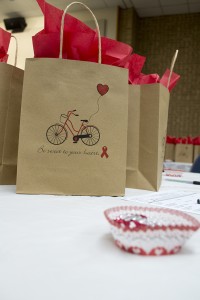
Photos by Katelyn Townsend/The Collegian
By Matt Koper/nw news editor
Laura Bartee took a quick poll of the room before she began her presentation.
She asked those in the audience to raise their hands if “they knew somebody who had heart disease or a cardiovascular event.”
A majority of the hands went up.
Bartee, a registered dietitian with Baylor All Saints Medical Center in Fort Worth, presented Heart Smart: Eating for a Healthy Heart Feb. 11 as part of Heart Awareness Month on NE Campus.
Bartee discussed uncontrollable risk factors for cardiovascular disease like age, gender, ethnicity and family history.
“For example, someone that has high blood pressure is at a higher risk to developing cardiovascular disease,” she said. “Unfortunately, African-Americans at are at a higher risk to develop high blood pressure than other ethnicities.”
Bartee said her goal wasn’t to scare anyone though.
“Yes, we have some of these uncontrollable risk factors, but we have a lot of controllable risks factors we’re going to go over today to prevent and reduce the risk of heart disease,” she said.
She cited the American Heart Association’s Life Simple 7, a list of lifestyle factors people can control or change. This list included things such as quitting smoking, eating a healthy diet and becoming physically active, which she considered to be the three most important things on the list.
“Stop smoking if you are because that is the easiest way to reduce your risk for cardiovascular disease,” she said.
Bartee said exercising is a great thing people can do for themselves.
“Exercise is going to offer a lot of benefit other than just exercising the heart muscle itself,” she said. “It’s going to help reduce blood pressure, be a good outlet for stress. So those of you that are trying to stop smoking, exercise may be a good way to get that anxiety relief you’re using tobacco for.”
Bartee then began to expand on dietary changes, her area of expertise.
“First thing you can absolutely do, and every single person in this room will benefit from this, is to reduce your sodium intake,” she said. “And if I had a dollar for every time one of my patients in cardiac rehab says, ‘Well, I don’t eat that much salt because I don’t put salt on my food,’ I would be rich.”
Bartee said people are still confused about how much salt they eat.

Photos by Katelyn Townsend/The Collegian
“The majority of salt Americans are eating doesn’t come from the salt shaker. It comes from the types of food we are eating,” she said.
People are not eating enough fruits and vegetables either, Bartee said.
“Nobody in this room, including myself, is eating enough fruits and vegetables,” she said. “We can really increase our health and reduce a lot of these risk factors by eating more fruits and vegetables.”
More tips that Bartee gave included reducing added sugar like those found in sodas or energy drinks, curbing a sweet tooth by eating fruits such as frozen bananas dipped in chocolate, choosing lean proteins, staying hydrated and avoiding trans-fats at all costs.
“Trans is horrible. We are working, the FDA is working to ban it, but we are not there yet,” she said. “So, trans-fat is made in a laboratory. It does nothing good for you.”
Bartee said she discussed lots of different tips and doesn’t expect an overnight change.
“I hope students stop smoking,” she said. “I hope they think more about the risk to develop cardiovascular disease. I know they are busy, but they can make a few small changes.”
NE student Josie Eaves believed the speaker had a lot of good information.
“She was very knowledgeable, and she made it to where everyone could understand,” she said.
NE student Christopher Smith said he was tuned into what Bartee presented.
“Well, she pretty much told me a lot of the stuff I already knew and was aware of,” he said.
Eaves said she is going to take steps to be healthier in her own life.
“I drink a little bit too much soda, like Sprite and everything,” she said. “I’m also going to start trying to do at least 30 minutes a day of walking since we got our treadmill recently.”

























